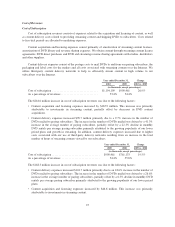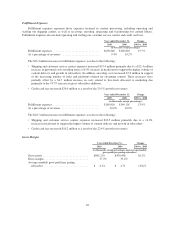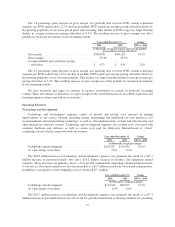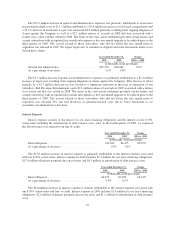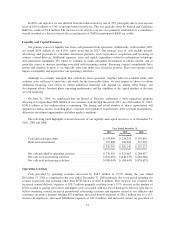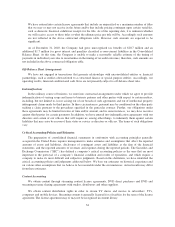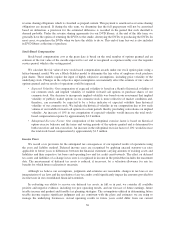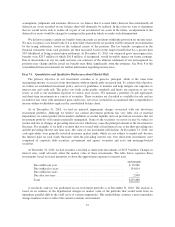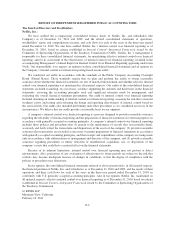NetFlix 2010 Annual Report Download - page 36
Download and view the complete annual report
Please find page 36 of the 2010 NetFlix annual report below. You can navigate through the pages in the report by either clicking on the pages listed below, or by using the keyword search tool below to find specific information within the annual report.We have entered into certain license agreements that include an unspecified or a maximum number of titles
that we may or may not receive in the future and/or that include pricing contingent upon certain variables,
such as domestic theatrical exhibition receipts for the title. As of the reporting date, it is unknown whether
we will receive access to these titles or what the ultimate price per title will be. Accordingly such amounts
are not reflected in the above contractual obligations table. However such amounts are expected to be
significant.
As of December 31, 2010, the Company had gross unrecognized tax benefits of $20.7 million and an
additional $1.7 million for gross interest and penalties classified as non-current liabilities in the Consolidated
Balance Sheet. At this time, the Company is unable to make a reasonably reliable estimate of the timing of
payments in individual years due to uncertainties in the timing of tax audit outcomes; therefore, such amounts are
not included in the above contractual obligation table.
Off-Balance Sheet Arrangements
We have not engaged in transactions that generate relationships with unconsolidated entities or financial
partnerships, such as entities often referred to as structured finance or special purpose entities. Accordingly, our
operating results, financial condition and cash flows are not presently subject to off-balance sheet risks.
Indemnifications
In the ordinary course of business, we enter into contractual arrangements under which we agree to provide
indemnification of varying scope and terms to business partners and other parties with respect to certain matters,
including, but not limited to, losses arising out of our breach of such agreements and out of intellectual property
infringement claims made by third parties. In these circumstances, payment may be conditional on the other party
making a claim pursuant to the procedures specified in the particular contract. Further, our obligations under
these agreements may be limited in terms of time and/or amount, and in some instances, we may have recourse
against third-parties for certain payments. In addition, we have entered into indemnification agreements with our
directors and certain of our officers that will require us, among other things, to indemnify them against certain
liabilities that may arise by reason of their status or service as directors or officers. The terms of such obligations
vary.
Critical Accounting Policies and Estimates
The preparation of consolidated financial statements in conformity with accounting principles generally
accepted in the United States requires management to make estimates and assumptions that affect the reported
amounts of assets and liabilities, disclosures of contingent assets and liabilities at the date of the financial
statements, and the reported amounts of revenues and expenses during the reported periods. The Securities and
Exchange Commission (“SEC”) has defined a company’s critical accounting policies as the ones that are most
important to the portrayal of a company’s financial condition and results of operations, and which require a
company to make its most difficult and subjective judgments. Based on this definition, we have identified the
critical accounting policies and judgments addressed below. We base our estimates on historical experience and
on various other assumptions that we believe to be reasonable under the circumstances. Actual results may differ
from these estimates.
Content Accounting
We obtain content through streaming content license agreements, DVD direct purchases and DVD and
streaming revenue sharing agreements with studios, distributors and other suppliers.
We obtain content distribution rights in order to stream TV shows and movies to subscribers’ TVs,
computers and mobile devices. Streaming content is generally licensed for a fixed-fee for the term of the license
agreement. The license agreement may or may not be recognized in content library.
34



